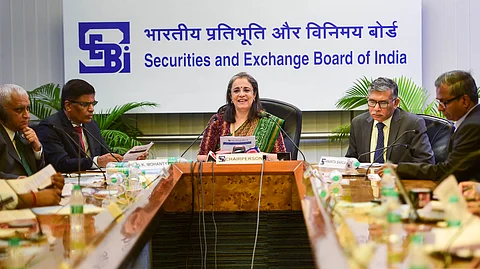

In a significant move, securities market regulator SEBI on Thursday, September 21, eased norms for borrowing by large corporates (LCs) on meeting a certain percentage of their funding requirements from capital markets through the issuance of corporate bonds.
The SEBI Board raised the monetary threshold to define large corporates and removed the penalty for not meeting the mandate of raising at least 25% of incremental borrowings for a financial year through the capital markets.
It also decided to introduce incentives and moderated disincentives.
A media statement released after the SEBI Board meeting stated, "With the view to facilitate ease of compliance and ease of doing business, the Board also decided to retain the requirement that compliance with the framework will be met over a contiguous block of three years. Further, it has been decided to dispense with the requirement on LCs for filing a statement identifying itself as an LC and statement regarding compliance with the framework."
After receiving representations from various stakeholders on the difficulties of meeting the earlier mandate, SEBI had floated a proposal to ease norms through a consultation paper on August 10.
The representatives had asked the regulator to leave the decision -- to borrow funds at the best-prevailing rates -- to the companies.
They said raising funds from banks and financial institutions was more cost-effective than through debt securities. In most such cases, meeting the requirement of 25 per cent of incremental borrowing through debt securities had become costlier with tightening liquidity and hikes in the benchmark rate.
They also said that industries such as textiles were given special packages by the Union and state governments to have access to timely and adequate capital at internationally comparable rates by providing interest subsidy benefits on the term loans raised for the new capital investments.
These industries, however, couldn't avail the benefits when funds were raised through debt securities, raising borrowing costs and impacting the viability of their projects.
For companies like those in the power sector, where tariffs are regulated, the cost of debt had a major bearing on tariff rates, the consultation paper said.
“A higher cost of debt would translate to higher tariff. Availability of credit at a lower cost is crucial in computation of such tariffs to final consumers,” it added.